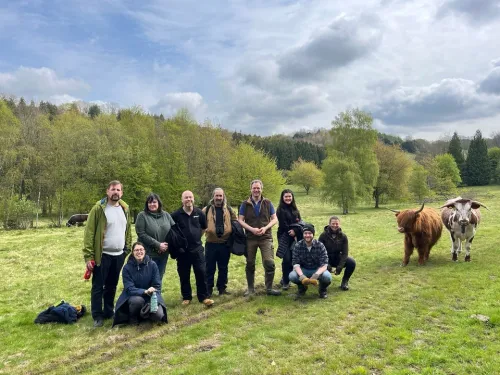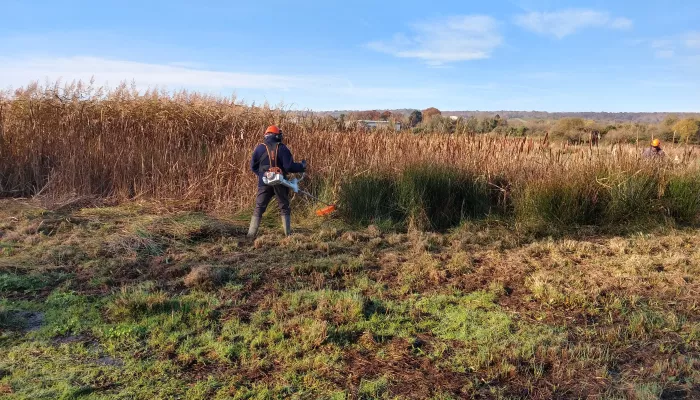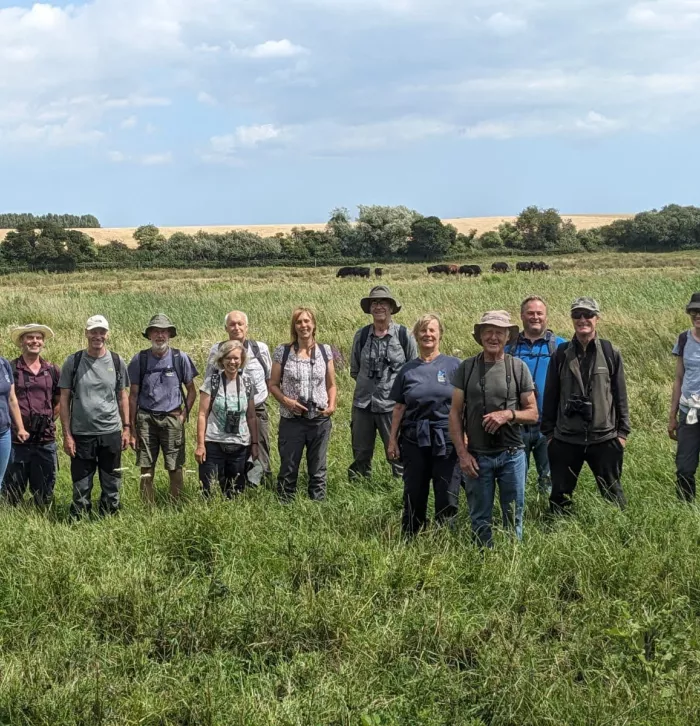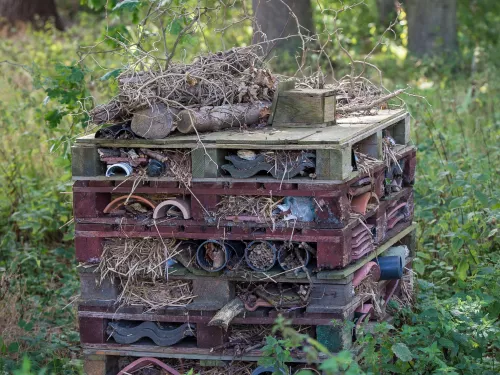
Team building volunteering days
Want to volunteer as a business or team? Wild Work Days are your chance to stuck in and really make a difference to nature, getting actively involved with a conservation task at a Kent Wildlife Trust reserve.

We couldn't do our work without our amazing volunteers. Interested in joining us as a volunteer? Find out how you can get involved here.
If you already volunteer with us, you can explore volunteering info here.
If you are a business interested in supporting Kent Wildlife Trust through a team volunteering day, you can find out more here.
Beautiful natural landscapes, inspiring conservationists, lasting friendships and the chance to safeguard wild spaces for future generations – Volunteering for Kent Wildlife Trust is as unique and special as nature itself.
Our conservation efforts throughout the county depend on our extended and remarkable volunteer team. Their collective commitment, willingness to share their time and skills, and compelling enthusiasm embody the spirit of collaboration. This dedication is vital as we pursue our 30x30 goal - ensuring that 30% of Kent’s land and sea are more climate-resilient and abundant in wildlife by 2030.
We’re fortunate enough to be supported by hundreds of volunteers at Kent Wildlife Trust, who donate their time and skills in so many different ways. Our volunteers are making a tangible difference. We couldn’t achieve all that we do as a Trust without our volunteers, and we’re so grateful for every single one of them.
Whether you have a few hours to spare or can commit to regular involvement, there’s a place for everyone in the effort to create a Wilder Kent!
No specific qualifications are required to volunteer, but enthusiasm, a willingness to learn, and a passion for conservation are highly valued. The Trust also ensures that volunteers are well-supported, recognised and offers ongoing training and development opportunities.
All our current volunteer opportunities with spaces can be found by following the link below...

We're always looking for volunteers to join our outdoor tasks throughout the county. You'll be working alongside our Area Wardens and a team of friendly volunteers, helping us to manage our reserves for wildlife.
We have a dedicated team of volunteer representatives who work with the Volunteer Staff Team to improve the volunteer programme. Find out more about them via the link below.
We have volunteers of all ages and abilities and our roles are varied. New and exciting ways of getting involved evolve all the time! Broadly speaking we have 5 categories:
Practical Conservation: hands-on activities such as habitat restoration, invasive species removal, and reserve maintenance. Volunteers work in teams under the guidance of experienced wardens.
Surveying and Monitoring: Research, surveying and monitoring roles involve collecting data on local wildlife populations and habitats. This information is crucial for informing conservation strategies.
Education and Outreach: Educational programs and events, engaging the public and raising awareness about conservation issues. This can involve leading guided walks, giving talks, and assisting with school visits.
Office Support: Administrative and data tasks, fundraising, marketing, and event planning.
Visitor Centres: Welcoming visitors, serving refreshments, using the till and merchandising stock.
No. We are grateful for all the ways people support our work.
This is your choice! Volunteering can be for a few hours, a day, a week, or on a regular basis. We have seasonal opportunities or ones that require a one off commitment to help at events. We are grateful for any time you give and will be flexible to your needs.
Kent Wildlife Trust encourages volunteers of all ages above 18 as long as they are able to take part safely.
We do not offer work placements or work experience.
You may still volunteer in many roles, depending on your offences. Volunteers must consent to a DBS check (minimum Basic Level), at application point.
Some volunteer roles may explicitly request a reference. This will be made clear in the role information.
No specific qualifications are required to volunteer, but enthusiasm, a willingness to learn, and a passion for conservation are highly valued.
Yes we reimburse reasonable travel expenses.
Volunteering is a wonderful way to develop your skills and experience. You will always be learning with us throughout your time volunteering and have the necessary training to complete all tasks safely. Some practical tasks can involve using power tools which you will have specific training to use, however this is always optional. You also have discounted access to Kent Wildlife Trust conservation study days.
Yes. Kent Wildlife Trust provides full insurance cover for volunteering.
Vehicle insurance coverage varies among providers, so it's crucial to confirm with your insurer that your volunteer driving is included. Such driving activities fall into these categories:
Commuting
If you drive your car to a regular volunteering location, it's important to verify with your insurance provider that commuting is covered.
Business Use
Business coverage might be necessary if you're using your vehicle to transport tools, equipment, or materials, or if your volunteer role involves traveling to additional sites beyond your initial destination. This may also apply if you have multiple destinations as part of your volunteering activities.
Some visas allow a person to volunteer, but others don't.
Volunteers should ask UK Visas and Immigration if their visa allows volunteering. They have an online tool to check if you need a UK visa.
People who have refugee status or humanitarian protection can do any type of work. This includes voluntary work and volunteering.
People who've applied for refugee status or humanitarian protection (asylum seekers) are often not allowed to work. But they can volunteer in both the public or voluntary sectors. This includes when they are appealing against a decision to refuse them asylum.
Learn more about volunteering for asylum seekers.
If you have a concern that a child or adult at risk is being harmed, is at risk of harm or you receive a disclosure (intentionally or unintentionally) you must contact a member of the safeguarding team as quickly as possible, using the email address below and call:
01622 662 012
Your safeguarding team are: Lee Mason-Baldwin (Designated Safeguarding Lead), Tom White (Safeguarding Officer), Abbie Johnson (HR Rep for Safeguarding) and Liz Lowe (Trustee for Safeguarding).
You can download a copy of the safeguarding reporting form here
Safeguarding is everyone's responsibility, including staff, volunteers and trustees. If you see something that doesn't feel right, then speak to a member of the safeguarding team.
If you are an agency and are applying on someone else's behalf who would like to volunteer but is an adult at risk, please email us at [email protected] so we can discuss if we are currently able to accommodate their needs.
If you already volunteer with us, you can explore volunteering info here.
Please contact the Volunteering team via email or on 01622 662012.

Want to volunteer as a business or team? Wild Work Days are your chance to stuck in and really make a difference to nature, getting actively involved with a conservation task at a Kent Wildlife Trust reserve.

Can't volunteer with us, or want to do more for nature at home? Here are some ways you can help your local wildlife - little changes can make a big difference.